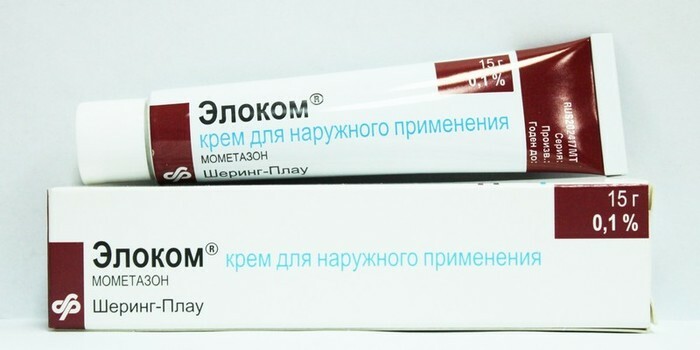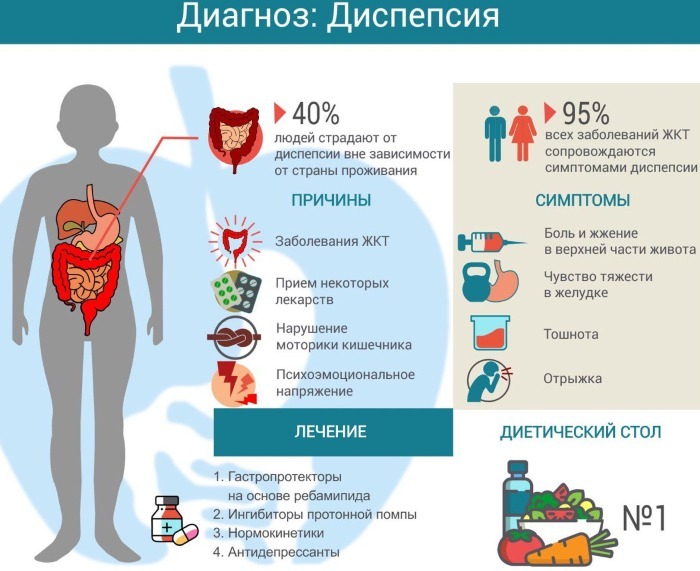Content
- Composition and form of release
- Terms of sale, price
- Pharmacological properties
- Pharmacodynamics and pharmacokinetics
- Indications for use
- Contraindications
- Methods of administration and dosage
- With pathologies of the upper respiratory tract
- For diseases of the lower respiratory tract
- With damage to the articular joints
- For infectious diseases of the genitourinary system
- Side effects
- Overdose
- special instructions
- Drug interactions
- Analogs
- Storage conditions and periods
- Video about the drug Erythromycin
Erythromycin - Potent Antibacterial Tablets, which are often prescribed to patients at a dosage of 500 mg for the treatment of diseases of inflammatory origin at different stages. The price of the remedy is affordable for most patients, therefore, if necessary, the patient can undergo a full-fledged treatment course. The medicine is considered effective and relatively safe when used correctly.
Composition and form of release
The drug is available to patients in several dosage forms, but the tablet is considered the most popular. It can be used at home and does not require any special manipulations that the patient could not perform on his own.
The tablets are oval in shape, white or almost white in color, small in size, they are covered with a special enteric coating. The medicine is packaged in standard plastic plates, the quantity in each of them can be 5-30 pieces. In each case, it is possible to choose the most appropriate amount of funds for completing a full course.
The composition of the product includes the component erythromycin, which has the main therapeutic effect.
The tablet dosage form also contains additional substances:
- Starch.
- Calcium stearate.
- Povidone.
- Talc.
- Polysorbate.
- Titanium dioxide.
- Castor oil.
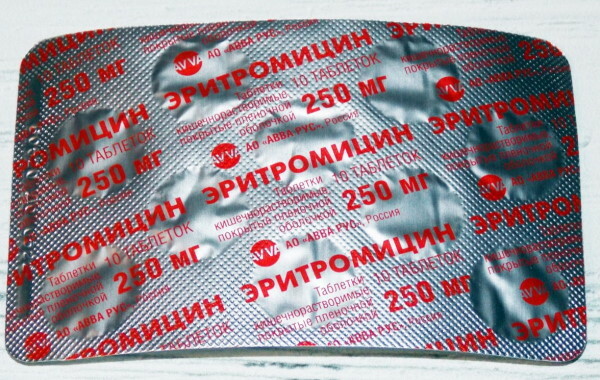
The amount of the main component per 1 tablet is 500 mg, but tablets of 100, 250 mg can also be found in pharmacies. They can have a different color and shape, their number in the plate is different.
Terms of sale, price
Erythromycin - tablets that are dispensed in different pharmacies in a dosage of 500 mg upon presentation of a prescription from a doctor. Their price ranges from 90-150 rubles. per packing.
The cost depends on the region of distribution of the drug, the number of tablets in the package.
Pharmacological properties
Pharmaceutical drug has antibacterial properties, helps to destroy gram-positive and gram-negative bacteria species that provoke inflammatory diseases internal organs.
As a result of the use of the agent, the pathogens of pathologies are rapidly destroyed, followed by the cleansing of the lesions from the products of their vital activity. Signs of inflammation, often manifested in the form of edema, redness, are gradually eliminated. Such manifestations can be noted in the case of localization of the focus on the skin or visible mucous membranes.
Pharmacodynamics and pharmacokinetics
After penetration of the agent inside, its film shell dissolves quickly, and the main substance penetrates into the blood, concentrating in the affected area. Erythromycin belongs to antibacterial drugs from the macrolide group and has bacteriostatic properties.
This means that when penetrating into the body, the main ingredient inhibits the growth and development of microbes, disrupts metabolic processes in them, which leads to the death of pathogens. When using the drug in high doses, doctors note the development of a bactericidal effect, that is, the drug destroys microbes faster.
There is also another effect on the body:
- The drug is active against gram-positive microorganisms, for example, bacilli, staphylococci, streptococci. The ability of the agent to fight Staphylococcus aureus, which often leads to the development of severe diseases of internal organs, is noted.
- The tablets help to destroy both gram-negative bacteria, as well as bacteria that provoke various infectious pathologies of the reproductive system. For example, the tablets are active against chlamydia, treponema pallidum, ureaplasma and microplasma.
- Some gram-negative bacilli are resistant to the action of the main substance, for example, salmonella, shigella, klebsiella.
- Perhaps the formation of drug resistance in some strains of Staphylococcus aureus, which is important to consider when prescribing a medication.
Erythromycin - 500 mg tablets, the price of which is quite low, quickly absorbed in the patient's body when taken orally. The tablet shell dissolves in the patient's intestines, and the component enters the bloodstream.
The maximum concentration of the substance is noted after 2-4 hours, which depends on the individual characteristics of the patient's body. The bioavailability of the component is high, reaching 65%, while binding to plasma proteins occurs by about 80%.
The substance accumulates in tissues unevenly, the highest dosage is determined in the liver, spleen and kidneys. But the study can also detect the concentration of the ingredient in the tissues of the lungs, lymph nodes, synovial fluid. Erythromycin penetrates into the seminal fluid, pleural cavity, middle ear fluid, which makes it effective in the treatment of the most common diseases of inflammatory origin.
A greater concentration of the ingredient is noted in the patient's bile than in the blood plasma. The substance passes into breast milk, and its amount in it reaches 50% of the total dose in the body. During pregnancy, the agent also enters the fetus in sufficient quantities, but the dose in breast milk is higher.
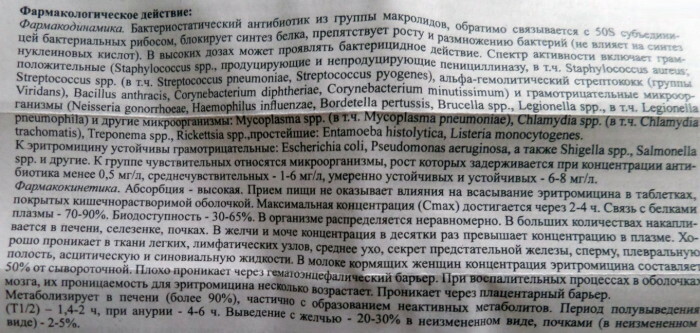
Despite the ability of erythromycin to penetrate well into tissues and biological fluids, it is minimally quantity enters the cerebrospinal fluid, the membranes of the brain, poorly overcomes the hematoencephalic barrier. Its concentration in such tissues does not exceed 10% of the total dose in other tissues.
When the membranes of the brain are damaged, the amount of the basic substance in them increases slightly, but this is not enough to provide a pronounced and rapid therapeutic effect. The processing of the ingredient is carried out in the liver, and its excretion occurs with the bile and with the help of the kidneys. When processed, erythromycin breaks down into metabolites.
Indications for use
The tabletted agent is indicated for the detection of diseases provoked by microorganisms sensitive to the component.
The main indications for treatment:
- Pneumonia at various stages, provoked by bacteria sensitive to the main component.
- Bronchitis, tracheitis and tracheobronchitis. The drug is prescribed as part of a comprehensive treatment.
- Pathologies of the middle ear, maxillary sinuses, sinusitis.
- Diseases of the upper respiratory tract of severe form. Tablets can be prescribed for laryngitis, tonsillitis, pharyngitis, but the doctor must make sure that the disease is not of viral origin.
- Infectious pathologies of soft tissues, accompanied by the formation of purulent foci of different sizes. Often the drug is prescribed for boils, purulent wounds, trophic ulcers and bedsores.
- Diseases of the biliary tract of infectious origin.
- Infections of the genitourinary system, provoked by chlamydia and other microbes.
- The primary form of syphilis without severe complications.
- Gonorrhea at various stages.
- Scarlet fever.
- Rheumatoid arthritis against the background of chronic tonsillitis. This disease often occurs in young patients. The drug can also be used to prevent the development of complications against the background of exacerbation of throat diseases.
The drug can be used to prevent the development of bacterial complications from the heart in patients who are being treated with surgery. Often the drug is used to treat patients who are allergic to antibiotics from the penicillin group.
Contraindications
Erythromycin - 500 mg tablets (the price of the product depends on the number of tablets in the package), not used in diagnosing intolerance to the components of the composition or a tendency to such reactions history.
Other barriers to treatment:
- Breastfeeding period. The drug in large quantities penetrates into breast milk, therefore, if it is necessary to prescribe it, it is worth refusing to feed for the entire period of treatment.
- Gastrointestinal bleeding. The tablets can be used only after the relief of acute symptoms.
- Hepatic failure in acute form, severe course of viral hepatitis.
- Renal failure The drug can be used only in the case of diagnosing infectious diseases against the background of insufficient organ function.
- Acute cerebrovascular accident.
- Diseases of the stomach and intestines in acute form, erosive or ulcerative changes in the mucous membranes.
The period of pregnancy is not considered an absolute contraindication for therapy, but the agent is rarely prescribed. Usually it is used in case of detection of chlamydia during gestation. At the same time, courses are always short, the minimum effective dosages are prescribed to obtain an effect. Relative contraindications include arrhythmia, severe heart disease.
Methods of administration and dosage
The tablet is taken only orally in the dosage prescribed by the doctor after a diagnostic examination. Depending on the disease and the severity of its symptoms, the treatment regimen and dose are different.
With pathologies of the upper respiratory tract
The dosage of the drug for patients over 14 years of age is 500 mg per dose. It can be repeated 2 times a day, which allows you to achieve a pronounced result. The tablet is consumed 1 hour before meals or 2-3 hours after taking it, since food somewhat slows down the process of absorption of components into the blood.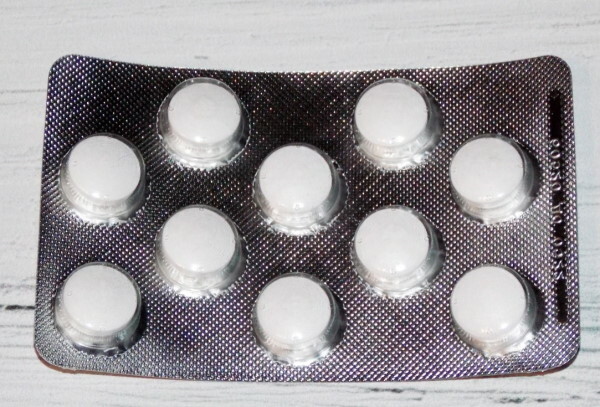
The duration of treatment for such diseases does not exceed 5 days, but sometimes therapy can be extended up to 7 days if the desired effect is not achieved.
For diseases of the lower respiratory tract
The defeat of the bronchi and lungs requires the use of funds for 10 days. The dosage for the patient is 2 g per day, that is, 4 tablets of 500 mg, which are taken every 6 hours, 1 piece with a sufficient amount of water.
Often, in combination with tablets, the patient is prescribed an antibiotic from another group for parenteral administration. This method eliminates the likelihood of complications from the respiratory system or other organs.
With damage to the articular joints
Inflammatory infectious pathologies of the joints can be treated with pills, since the main substance in large quantities penetrates into the synovial fluid. With bursitis, arthritis and some other disorders, the course of therapy lasts up to 2 weeks.
The dosage is selected depending on the severity of the symptoms. With a mild course, 1 g per day is enough, with a severe one - up to 2 g per day. Always the daily rate is divided into 2 or 4 doses during the day at approximately equal intervals.
As in other cases, you should not combine the use with food, but it is important to drink the product with a sufficient amount of water.
For infectious diseases of the genitourinary system
Erythromycin - 500 mg tablets (the price of the drug when purchasing a large package is higher), used for lesions of the genitourinary system for 10-14 days. The dose for the patient can be 1-3 g, depending on the patient's condition. Necessarily it is divided into 2 doses during the day, observing an equal time interval.
In the case of a severe course of the disease and the appearance of complications in the patient, it is possible to increase the daily dose to 4 mg. In this case, it is imperative to consume the daily rate 4 times during the day.
Side effects
The drug in tablet form can provoke not only allergic reactions, but also complications from the internal organs.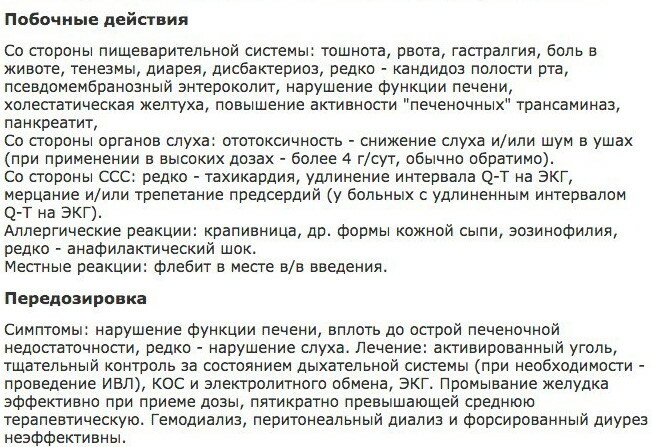
| Damage area | Frequent complications |
| Nervous system | Headache and dizziness often bother patients during the period of therapy. Many talk about decreased performance, weakness and irritability, sleep disturbance. Symptoms disappear after refusal of treatment for several days; additional medications are rarely required. |
| Digestive organs | On the part of the digestive tract, negative reactions appear in the form of standard symptoms. Patients report nausea and bouts of vomiting, heartburn, abdominal pain and upset stools. Over the course of several days, the symptoms may worsen, there is an increase in stool frequency, which certainly leads to the development of dehydration against the background of impaired absorption of fluid in the digestive path. |
| urinary system | Increased urination and pain in the kidney and bladder area disturb patients with a history of chronic diseases of the urinary system. The manifestations quickly disappear if the patient refuses to take the drug. |
| Leather | Allergy to the drug is manifested by classic symptoms in the form of a skin rash, severe itching and burning, irritation. Symptoms can spread over large areas, especially if the patient is prone to such reactions. |
Complications are considered a reason for canceling treatment, but in each case, the doctor makes this decision individually.
Overdose
Taking the medicine in the prescribed dose does not lead to the development of an overdose, but long-term use of pills in large quantities will certainly provoke such complications. The condition is accompanied by the aggravation of all negative reactions, as well as the appearance of severe complications.
Patients report repeated vomiting during the day, severe weakness and impaired coordination of movements. For several hours, all allergic manifestations are aggravated, edema of the mucous membranes of the eyes, oral cavity and nasal passages is observed.
Patients may notice watery eyes, the appearance of signs of allergic rhinitis. The condition requires immediate medical attention, which is different in each case. Be sure to wash the stomach for all patients, after which enterosorbents and other drugs are prescribed, depending on the symptoms. Conducting hemodialysis in the event of an overdose is ineffective.
special instructions
Erythromycin - 500 mg tablets (the price of a drug with a lower dosage per 1 tablet is slightly lower), prescribed only according to indications. They are not used for prophylactic purposes, since they cannot prevent the development of infectious diseases. An exception is the case when tablets are prescribed for exacerbation of tonsillitis in order to prevent the development of complications from the articular joints.
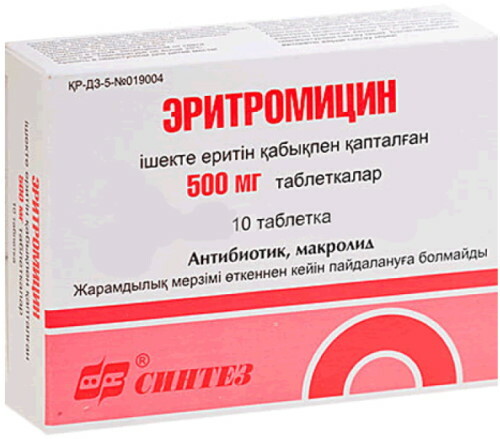
The tablet should not be split, crushed, or chewed when taken. This disturbs the structure and can lead to a weakening of the effectiveness of the treatment.
Drug interactions
The tool reduces the effectiveness of hormonal contraceptives for oral use, which is important for women to take into account when undergoing a therapeutic course. The nephrotoxicity of some drugs in combination with tablets increases slightly.
Simultaneous administration in combination with antacid medicines is not recommended, which is associated with a decrease in the absorption of the ingredient. If the patient needs the appointment of such medications, it is necessary to take them separately from the antibiotic, observing an interval of at least 2 hours.
Analogs
The drug has analogues, many of which belong to the same group, but may have a different composition.
Most often, patients are shown the following substitutes:
- Azithromycin is considered the most popular analogue with the same properties. The drug is available in the form of capsules, tablets for oral use and a lyophilisate, from which a solution is prepared for parenteral administration. The tool belongs to the group of macrolides, but its action is carried out due to the presence of the substance azithromycin in the composition. The drug is active against most gram-positive and gram-negative microorganisms, it is prescribed in short courses. Unlike the original medication, the analogue is allowed to be used only once a day, which facilitates the treatment process.
- Clarithromycin belongs to the group of macrolides and contains the active ingredient of the same name in the composition. It is available in different dosage forms, but tablets with a dosage of 500 mg are especially popular. Like the original, the drug is indicated for infectious inflammatory diseases of soft tissues, internal organs, articular joints. The drug is considered effective and relatively safe, despite its different composition.
When choosing an analogue, the specialist assesses the patient's condition, determines the need to prescribe a particular medication.
Storage conditions and periods
For 3 years, it is allowed to store the product in a dark and cool place, away from children and direct sunlight.
After the expiration date, it is forbidden to use the tablets.
Erythromycin is considered one of the most popular macrolide antibacterial agents. Tablets with a dosage of 500 mg can be used at home, help to quickly stop the symptoms of diseases and prevent the development of complications. The price of the drug is affordable, which is considered to be another of its advantages.
Video about the drug Erythromycin
Erythromycin tablets indications and instructions:

